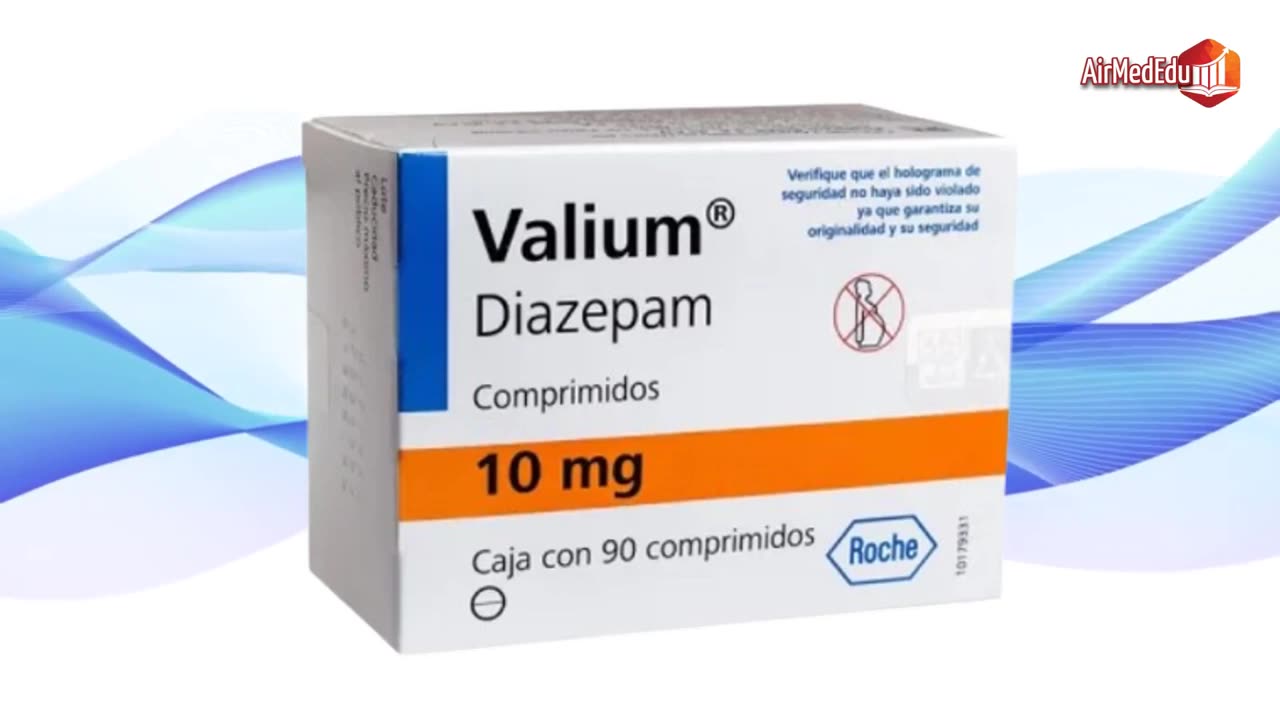Premium Only Content

Is there a natural herbal substitute for Valium?
Valium, scientifically known as diazepam, is a drug belonging to the benzodiazepine family, widely used to treat disorders such as anxiety, insomnia, muscle spasms, and even certain types of seizures. Its main mechanism of action is by enhancing the effect of the neurotransmitter GABA in the brain, producing a feeling of calm and relaxation by inhibiting excessive neuronal activity. However, prolonged use can lead to dependence, tolerance, and a series of side effects such as drowsiness, confusion, or memory problems, which has led many people to seek natural or herbal alternatives that offer similar benefits without the risks associated with synthetic drugs. Although there is no exact substitute that 100% replicates the effects of Valium, as herbs act in a more subtle and varied way on the body, several botanical remedies have demonstrated calming and anxiolytic properties in scientific studies and traditional uses. These include valerian, passionflower, chamomile, kava, and ashwagandha, among others. It's important to note that, although natural, these are not without risks, and it's always recommended to consult a healthcare professional before incorporating them, especially if you're taking other medications.
Valerian, a plant native to Europe and Asia whose root has been used since ancient times to promote sleep and reduce stress, is emerging as one of the most studied options as an herbal alternative to Valium. Its effects focus on modulating the central nervous system, similar in some ways to diazepam, by increasing the availability of GABA and possibly influencing serotonergic receptors, resulting in a mild sedative action that helps calm the mind without inducing a state of deep sedation. In the body, valerian works by slowing the transmission of nerve signals, which reduces the brain hyperactivity associated with anxiety and facilitates sleep. Studies have shown that its active compounds, such as valerenic acids and valepotriates, interact with enzymes that regulate neurotransmitter metabolism, promoting a balance that relieves symptoms of restlessness and muscle tension. Valerian's benefits are notable in people with mild insomnia or moderate anxiety, where it can improve sleep quality without the residual effects of daytime drowsiness that often accompany Valium. It has also been observed to reduce daily stress, improving overall well-being without drastically altering cognitive alertness.
Regarding the recommended dosage for valerian, adults typically take standardized extracts that provide between 300 and 600 milligrams per day, divided into two or three doses, preferably before bedtime to maximize its hypnotic effects. This amount is based on preparations containing at least 0.8% valerenic acids, and it is suggested to use it for periods of up to six weeks to avoid possible body adaptations. However, side effects are not uncommon; Some users report dizziness, headaches, stomach upset, or vivid dreams, and in rare cases, it can cause a feeling of mental dullness that affects concentration. More concerning is the potential for dependence with long-term use, which could lead to withdrawal symptoms such as rebound insomnia or irritability upon abrupt discontinuation. Therefore, precautions are essential: it should not be combined with alcohol or sedatives such as Valium, as this would increase drowsiness and the risk of accidents. Furthermore, it is advisable to stop using it at least two weeks before surgery, as it may interact with anesthetics. Pregnant or breastfeeding women should avoid it due to a lack of sufficient safety data, and those taking medications metabolized by the liver, such as certain antidepressants, should monitor their liver enzymes to prevent interactions.
Another herbal remedy gaining popularity as a potential Valium substitute is passionflower, a tropical vine known for its showy flowers and calming properties, traditionally used in Latin America and Europe to treat nervousness and insomnia. Its effects are manifested through compounds such as flavonoids and alkaloids that modulate the GABAergic system, similar to the mechanism of diazepam, but in a gentler manner, inhibiting neuronal excitability and promoting muscle relaxation that relieves accumulated tension. In the body, passionflower acts by elevating GABA levels and possibly influencing serotonin, resulting in an anxiolytic action that reduces mental rumination and facilitates rest without inducing forced sleep. Research has indicated that its extracts may be effective in generalized anxiety disorders, where they help mitigate symptoms such as palpitations or restlessness, offering relief comparable to some drugs in preliminary studies. The benefits include not only anxiety reduction but also support for chronic stress management, improving mood and quality of life without the risks of addiction associated with benzodiazepines.
For passionflower dosage, the recommended dose is typically between 500 and 1,000 milligrams of dried extract per day, divided into doses, or as an infusion with 1 to 2 grams of the dried plant per cup, consumed up to three times daily. This range is adjusted according to the concentration of active ingredients such as vitexin, and it is suggested to limit its use to short periods of four to eight weeks to assess individual response. However, side effects may include drowsiness, confusion, or nausea at high doses, and in rare cases, allergic reactions such as skin rashes. It is crucial to take precautions, such as avoiding combinations with sedatives or alcohol, which could amplify central nervous system depression and cause extreme dizziness or respiratory problems. Furthermore, it is not recommended for pregnant women, as it may stimulate uterine contractions, nor for people with liver disorders, given that some compounds are metabolized in the liver and may interact with medications such as blood thinners or antidepressants. It is always prudent to start with low doses and monitor any changes in mood or physical state.
Chamomile, a common herb in herbal teas and home remedies, represents a more accessible and gentler alternative to Valium, with a history of use in traditional medicine to calm nerves and promote sleep. Its effects come primarily from apigenin, a flavonoid that binds to benzodiazepine receptors in the brain, partially mimicking the action of diazepam by boosting GABA and reducing the inflammation that often aggravates stress. In the body, this action results in a decrease in sympathetic activity, which lowers the heart rate and relaxes muscles, offering mild relief from everyday anxiety and occasional insomnia without profoundly altering consciousness. Studies have supported its usefulness in moderate anxiety disorders, where it can improve sleep and reduce symptoms such as irritability, acting as a natural stress modulator without the intense sedative effects of medications. Its benefits include its accessibility, as it is easily consumed as a tea, and its ability to support digestion, which is often affected by anxiety, contributing to holistic well-being.
In terms of dosage, chamomile is commonly taken as an infusion of 1 to 2 grams of dried flowers per cup, up to four times a day, or in standardized extracts of 220 to 1,100 milligrams daily. This flexibility allows it to be adjusted to individual needs, but it is advised not to exceed prolonged periods without supervision to avoid sensitization. Side effects are rare and are usually limited to allergic reactions in people sensitive to plants in the Asteraceae family, such as nausea or dermatitis, although high doses may cause drowsiness. Precautions include avoiding it in combination with anticoagulants, as it may enhance their effect and increase the risk of bleeding, and avoiding its use during pregnancy due to possible uterine effects. Furthermore, those taking sedatives should be cautious, as it may intensify fatigue, and it is advisable to consult if you suffer from asthma or cross-allergies. Its benign profile makes it ideal for initial use in the search for natural calm.
Kava, a plant native to the South Pacific islands whose root is used in traditional ceremonies to induce relaxation, is positioned as a potent but controversial herbal substitute for Valium, with effects that include a marked reduction in anxiety thanks to its kavalactones. These substances act in the brain by modulating GABA receptors, similar to diazepam, but also by inhibiting the reuptake of norepinephrine and dopamine, producing a feeling of mild euphoria and muscular calm without compromising mental clarity. In the body, kava slows down the central nervous system, relieving tension and promoting a state of well-being that has been compared in studies to that of benzodiazepines, although with a more gradual onset. Its benefits are evident in the management of generalized anxiety and stress, where it can improve sleep and reduce drug withdrawal symptoms, offering an alternative for those seeking to wean themselves off synthetic sedatives. Furthermore, in cultural contexts, it promotes sociability without the inhibiting effects of alcohol.
The typical dose of kava ranges from 100 to 250 milligrams of standardized extract containing 30-70% kavalactones per day, divided into doses, and is recommended to be limited to periods of up to six months to minimize risks. Traditional preparations such as drinks are also common, but require moderation. However, side effects can be significant, including drowsiness, motor coordination problems, and, in severe cases, liver damage, which has led to bans in some countries. Strict precautions are necessary: avoid it in people with liver disease, as it can elevate enzymes and cause toxicity, and do not combine it with alcohol or sedatives, which would amplify central depression and pose risks such as driving accidents. Pregnant or breastfeeding women, or those taking medications for Parkinson's disease, should abstain, and liver function should always be monitored with regular testing to prevent serious complications.
Finally, ashwagandha, an adaptogenic herb from Ayurvedic medicine native to India, offers a unique perspective as an alternative to Valium by helping the body resist stress by modulating cortisol and balancing hormones. Its effects include calming the brain and reducing anxiety by influencing the hypothalamic-pituitary-adrenal axis, boosting GABA, and reducing inflammation, resulting in a restorative action that differs from diazepam's direct sedative effect but provides sustained relief. In the body, it works by lowering blood pressure, strengthening the immune system, and improving sleep, with studies demonstrating its effectiveness in anxiety disorders and chronic stress. The benefits include not only the reduction of mental symptoms but also physical improvements such as increased energy and stamina, making it a comprehensive option for wellness.
For ashwagandha dosage, it is suggested to take up to 1,000 milligrams of the extract standardized with withanolides daily, divided into doses, for up to 12 weeks. Side effects include stomach upset, diarrhea, or, rarely, liver problems at high doses. Key precautions: avoid during pregnancy due to the risk of miscarriage, during autoimmune conditions due to possible exacerbation of symptoms, and discontinue before surgery due to effects on the nervous system. Do not combine with sedatives or thyroid medications without supervision, and monitor liver function for safety. In summary, while these herbs offer promise as natural substitutes, their use should be informed and cautious to maximize benefits and minimize risks.
-
 8:34
8:34
Millionaire Mentor
16 hours agoTrump FIRES BACK After Mamdani’s SHOCKING Threat To New York City
5.49K3 -
 1:02:02
1:02:02
A Cigar Hustlers Podcast Every Day
1 day agoEpisode 4 Hustler Every Day Target 10/4, No More Pennies and Gronk Is The Man
3.53K1 -
 3:07
3:07
GreenMan Studio
1 day agoHOW TO NOT SELL OUT IN 2025 W/Greeman Reports
4.05K6 -
 0:43
0:43
WildCreatures
2 days ago $1.55 earnedDiver is swallowed up by a passing bait ball at Darwin Island
4.89K4 -
 1:54
1:54
Damon Imani
3 days agoDamon Left The View SPEECHLESS on Marriage And Government Overreach
5.99K9 -
 4:09
4:09
Memology 101
14 hours ago"Journalist" REPEATEDLY tries and FAILS to bait John Fetterman into calling Trump an "AUTOCRAT"
4.84K12 -
 58:02
58:02
Dialogue works
2 days ago $3.44 earnedMatthew Hoh: Ukraine’s Army Is COLLAPSING Everywhere!
28.2K16 -
 17:24
17:24
Nate The Lawyer
1 day ago $1.98 earnedBREAKING: NEW Scientific Evidence Shows Men Are Better in Sports Than Women
13.7K12 -
 29:43
29:43
Code Blue Cam
1 day agoHow Missing Dipping Sauce Turned into a Felony Arrest
15.8K12 -
 16:19
16:19
BlaireWhite
2 days agoWoman Confronts "Trans Woman" In Locker Room: Gold's Gym Scandal
15.3K10